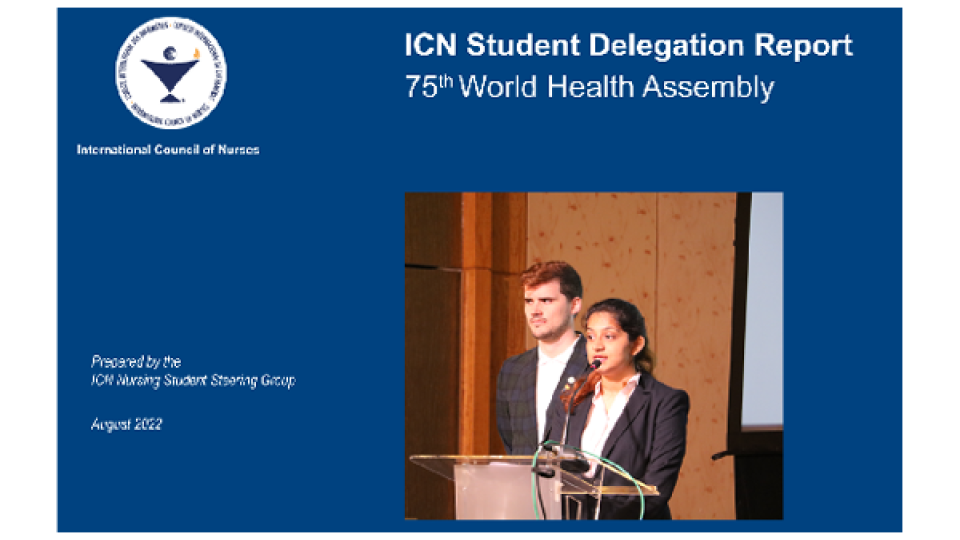Nursing students report on experience at World Health Assembly

Recognising the importance of giving student nurses a voice at the highest levels, the International Council of Nurses (ICN) was pleased to give nursing students the opportunity to attend the 75th World Health Assembly in May 2022.
To mark International Youth Day today, ICN has published a report written by the students in their own words to describe the impact of their involvement and how the matters discussed under each agenda item affect young nurses and nursing students across the world.
The 75th World Health Assembly (WHA) took place in Geneva, Switzerland from 22-28 May 2022. ICN has already published a report on its involvement in WHA 75.
Each year ICN hosts a student delegation to the WHA which offers student nurses the opportunity to participate in the WHA and bring the student and youth voice to the discussions. For this year’s WHA, each member of the ICN Nursing Student Steering Group (NSSG) mentored students from their region through the WHA experience and encouraged them to get involved in all aspects of the WHA including Committee Meetings and side events.
The ICN NSSG works to increase active nursing student and early career nurse representation and engagement within ICN to enhance the nursing student influence within the organisational decision-making processes and in global health and nursing policy dialogue. Aiming to strengthen and enhance the work of ICN National Nurses Association (NNA) members and support them to engage with their student populations.
Once the WHA concluded, each student who took part was asked to write a synopsis of the sessions they covered. Agenda items covered in the student report included prevention and control of non-communicable disease; strategies on HIV, viral hepatitis and sexually transmitted infection; infection prevention and control; human resources for health; WHO Health Emergencies Programme; WHO preparedness for and response to health emergencies; the global Health for Peace initiative; human organ and tissue transplantation; and public health dimension of the world drug problem.
One member of the student delegation, Fatema Alarab said “As a student nurse, I am glad that agenda item 14.1 [on non-communicable disease] was well discussed and presented over the course of several days during the World Health Assembly... To care for people with NCDs, who often have co-existing mental health disorders, early career nurses and nursing students should be enabled to explore their full scope of practice, focusing on their roles as health educators and patient advocates. This requires providing safe working environments and investing in nursing education.”
Nursing students Asfarada Rizky and Ayush Belwal reported on Item 14.6 Infection prevention and control, saying:
“Students from healthcare professional backgrounds have a responsibility to sensitize their environment locality and general public towards basic sanitary habits such as hygiene and the adoption of hygienic dietary habits. Even during the COVID-19 pandemic, students had a role and responsibility to sensitize the general public towards the adoption of optimal hand hygiene and social distancing which was well demonstrated through their campaigns.”
Canadian nursing student Amie-Rae Zaborniak reported on Item 16.1 on the Independent Oversight and Advisory Committee for the WHO Health Emergencies Programme saying:
“Nursing students and early career nurses are embarking on their nursing career journeys during a complex and dynamic time in the world and in healthcare. These future nurses are experiencing ‘real time’ and ‘on the ground’ educational experiences in health equity and social justice issues from the very beginning of their nursing careers. They hold the potential to be leaders (in nursing practice, administration, education and research) in their contributions toward the recognition and response to future health equity and social equity challenges within the context of health emergencies across the globe.”
Speaking about the increasing role of technology in healthcare, she added:
“Many nursing students and early career nurses may not have known a world without some degree of technology in which to access and disseminate information. The perspectives and ideas of these individuals may be of value for harnessing the facilitators, in addition to the potential barriers of technology in terms of the ways in which the ‘what’ (information) and ‘how’ (communication approaches) inform how healthcare workers, such as nurses, navigate health information alongside healthcare users such as patients and clients during future health emergencies.”
Róisín O’Connell and Ayush Belwal, nursing students from Ireland and India respectively, wrote about the WHA discussions on agenda item 27.4: Public health dimension of the world drug problem.
“As nursing students and early career nurses, the prevalence of drugs is evident in our daily working lives. We are now seeing the implications of more people becoming subject to substance use disorders. It is important that as junior health care workers we learn to encompass respect, dignity and compassion for all the patients for whom we care, particularly those affected by substance use.”
For many members of the NSSG, this was not their first attendance at the WHA, but for those who had never attended before, it was an experience they found extremely interesting and felt grateful to have been given the opportunity to represent their fellow students at such an important event.
ICN believes that nursing students and early career nurses must be given the opportunity to attend these events to offer a unique perspective on how these matters are affecting them. It also allows them the opportunity to feel that they can aid in making the profession better for all nurses across the world.
Download the communique here